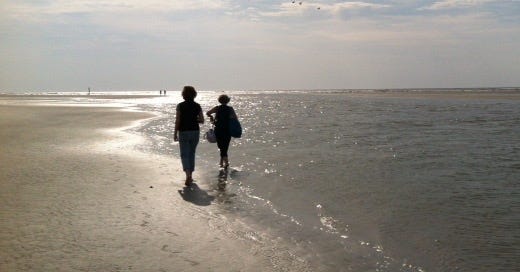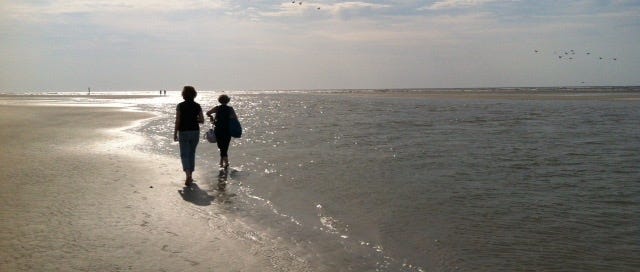An invitation to confusion and then to holy curiosity
As usual, this morning I’m offering you the first step in moral clarity — confusion. Which, if we understand it to be a nudge of the Holy Spirit might lead us onto holy curiosity. There is such a thing as unholy curiosity or even evil curiosity, but that's not my concern at the moment. Holy curiosity has to do with our seeking of wisdom. We pray “guide us in the way of justice and truth.”
One of the challenges in doing social ethics is to avoid falling into the place of our comfortable certainty. That's the place that aligns with our political ideology or the views of most of our friends or what is currently trending in the thinking of a society. For me the starting point is a life of prayer given to adoration in awe, combined with at least a minimal understanding of the virtues, and finally, to include an open hearted listening to views that challenge our place of certainty and comfort.
Most of the people I know have got very firm opinions about the war between Israel and Hamas. So let me see if I can create some confusion in each of our minds. And then I will leave it to the Holy Spirit and each of our consciences to enter into holy curiosity.
The case for and against Israel's war in Gaza
I did a search. I asked, “the case for Israel's war in Gaza, then I asked “the case against Israel's war in Gaza.” to my surprise what first came up was the same material in answer to both questions. Amnesty International telling me that Israel was committing genocide. You have to specifically ask about occupation or colonialism to get those results. So I decided to stay with genocide.
So after mucking about trying to find a few articles. I selected these three.
The Amnesty report accepts the fact that under international law genocide must include intent. Though it does seem to be making a case that the amount of deaths and destruction are evidence of the intent. However it also does get at the intent question more directly by noting that some Israeli officials have made statements that can be seen as genocidal.
“To establish Israel’s specific intent to physically destroy Palestinians in Gaza, as such, Amnesty International analysed the overall pattern of Israel’s conduct in Gaza, reviewed dehumanizing and genocidal statements by Israeli government and military officials, particularly those at the highest levels, and considered the context of Israel’s system of apartheid, its inhumane blockade of Gaza and the unlawful 57-year-old military occupation of the Palestinian territory.”
I have much to write to you, but I would rather not write with pen and ink; instead I hope to see you soon, and we will talk together face to face. (3 John:14-14)
The Top 7 Lies About Israel and IDF Operations in Gaza
This report makes the case that Israel’s actions show an intention of trying to avoid civilian casualties. That Israel's actions, in fact, are the opposite of genocide. “None of Israel's actions meet this threshold (of genocide). Israel targets Hamas — an armed terrorist entity that initiated the war with mass atrocities on October 7. The IDF issues evacuation warnings, facilitates humanitarian aid, and restricts military operations to lawful targets. There is no Israeli policy, order, or pattern of action that suggests an attempt to destroy the Palestinian people. Even the International Court of Justice (ICJ), despite accepting a politically driven genocide claim for preliminary hearings, has not ruled that Israel is committing genocide.”
Do not be like horse or mule, which have no understanding; *
who must be fitted with bit and bridle, or else they will not stay near you.” (Ps 32:10)
What did ICJ ruling mean in South Africa's genocide case against Israel?
A BBC analysis that looked at the claim that the ICC “had concluded that the claim that Israel was committing genocide in Gaza was ‘plausible.” That claim spread widely. However, “Joan Donoghue, the president of the ICJ at the time of that ruling, said in a BBC interview that this was not what the court had ruled. Rather, she said, the purpose of the ruling was to declare that South Africa had a right to bring its case against Israel and that Palestinians had “plausible rights to protection from genocide” - rights which were at a real risk of irreparable damage.”
Who can fail to do you homage, Lord,
and sing the praises of your Name? *
for you only are the holy One.
All nations will draw near and fall down before you, *
because your just and holy works have been revealed.
The Song of the Redeemed Magna et mirabilia
This abides,
Brother Robert, OA
Other postings on social ethics
The menorah and the swastika We cannot eliminate the darkness, but we can get better at bearing the light. Our first job as Christians is to seek to know and love God, to say the prayers and to participate in the Eucharist. And with that base, we do our best to understand the truth of what’s happening around us and to respond to that truth. We are called to treat all people with the dignity they deserve because they were created in the image of God and because, as John says, they carry the true light, which enlightens everyone.
Why are the nations in an uproar? Please hear me, I'm not suggesting that this pattern is true in everything this administration is doing. And of course, even if the behavior is professional and competent, I might still disagree with it. But all that said, in the service of truth and humility, might it be useful to take note of areas in which our government is functioning in a manner that is appropriate? If we don't do that, we are simply trapped in tribal narrative and conspiracy?
They don’t have political culture For the pope “political culture” offered something more worthy and enduring around which adversaries might act with a bit of humility. And the pope certainly knew, that in many nations, the political culture had been strongly influenced by Christian values.
The American Church Conflict In proposing a Confessing Church stance he calls us to be salt and light. If we tilt to the right to speak for the poor and powerless and the rule of law. And if on the left to note how “they deny transcendent truth one day; the next, they announce a new truth, and their online mob will bully and harass us for failing to jump on their latest cause de jour.”
Immigration and social ethics Mercy, grace, justice, and compassion are among the virtues in play. So are the ability to accept paradox, humility, the courage to make decisions that may be in a field between bad and very bad, a sense of balance grounded in an awareness of complex situations, prudence or having good sense and practical judgment and wisdom….Parish clergy could be a little more humble in their preaching. Before making pronouncements on the major issues of the age, they might do some research that exposes them to a variety of reasonable, wise, moral approaches to the issue. That might include noting how Christians may in good conscience differ about the best way forward in Gaza, Ukraine, Sudan, Haiti, and yes, immigration in the United States.





Thank you for having the courage to take the plunge into this complex, nuanced, divisive topic, Robert. I am going to the Holy Land in July, and even my mentioning of this forthcoming trip draws lots of raised eyebrows, opinions, etc. In all honesty I just don't what to think/believe. But my recent broadening of news/opinion sources (ie: The Free Press to counterbalance NPR) has been extremely helpful.